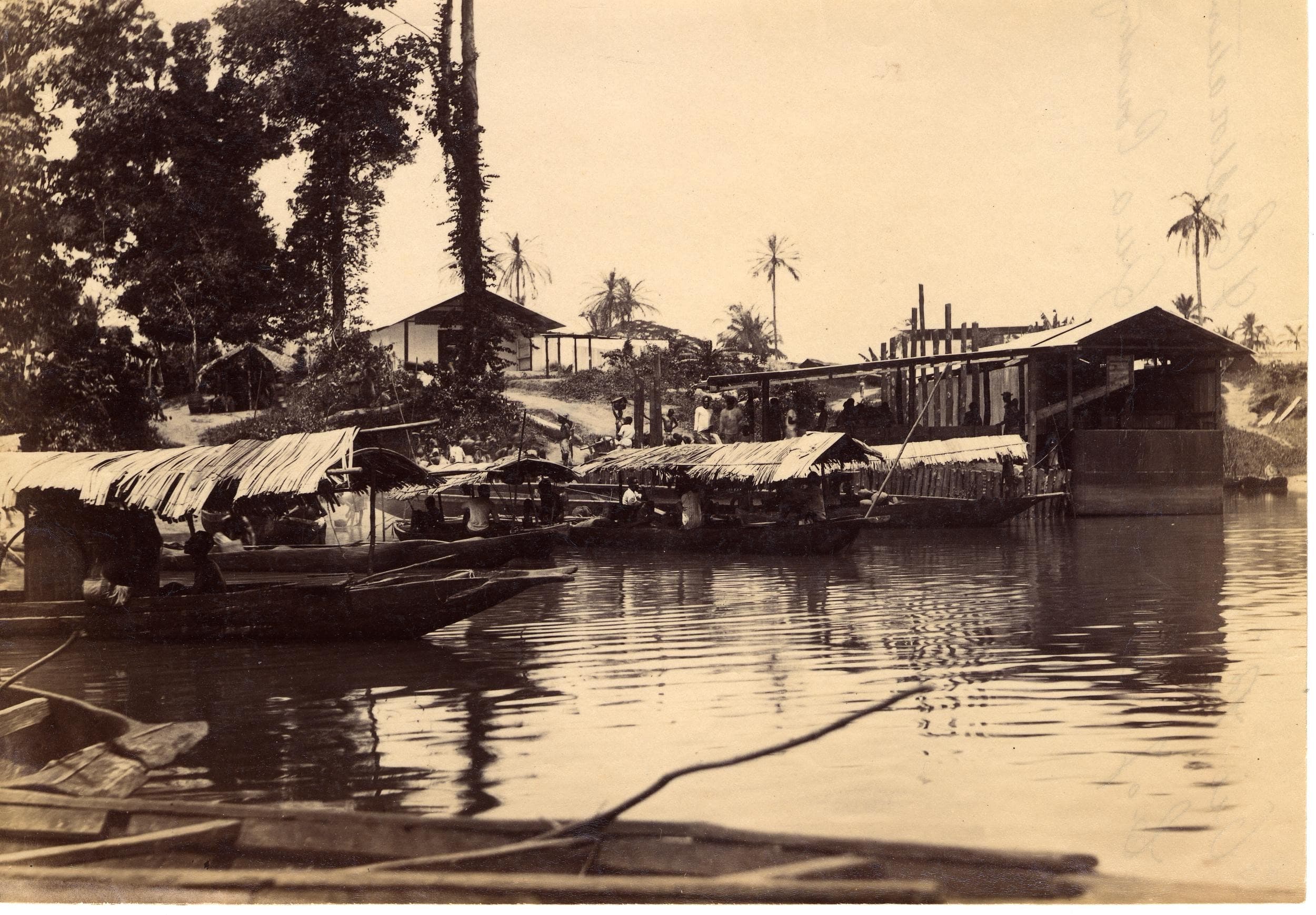King's College London
Nigeria: Practices of Colonial Power in the Niger Delta

Authored and curated by Naluwembe Binaisa
Time echoes through this preliminary visual enquiry into practices of colonial power in the Niger Delta. It seeks to trace the complex iterations of injury as well as the multi-sited cycles of agency. The people, land and environment on this rim of the West African coastline, whose interior is bisected by the mighty River Niger, have for centuries been imbricated in the violent dynamics of the Africa <> Europe compact. From slavery to palm oil, to petroleum and poverty, these people, their land and environment persist despite centuries of hope dressed up as civilizing missions, dispossession framed as material progress. At the center of these seemingly endless iterations of violence, hope, conflict and resource extraction, are the exigencies of . This forms the bedrock on which practices of colonial power rest to sustain multi-dimensional injury, which continues to bleed into postcolonial Nigeria. Fieldwork and ongoing research across the course of this project will seek to enrich this enquiry and incorporate private and alternative archives, documents, images, objects and testimonies, to further interrogate colonial practices and their afterlives. In this exhibition four interrelated themes trace these sedimented flows: Treaties and Maps; Symbolic Power; Circuits of Extraction and Production; Agency and Resistance.
References
- Achebe, C. 2006. Things Fall Apart. Penguin Classics. (First published 1958).
- Adi, H., 1993. West African students in Britain, 1900–60: the politics of exile. Immigrants & Minorities, 12(3), pp.107-128.
- Amadi, L. E. 1977. Church-state involvement in educational development in Nigeria, 1842-1948. Journal of Church and State, 19(3), pp.481-496.
- Anderson, M.G. and Aronson, L. eds., 2017. African Photographer JA Green: reimagining the indigenous and the colonial. Indiana University Press.
- Danewid, I., 2023. Resisting racial capitalism: An antipolitical theory of refusal. Cambridge University Press.
- Dike, K.O., 1956. Trade and politics in the Niger Delta, 1830-1885: an introduction to the economic and political history of Nigeria. Clarendon Press.
- Ebeku, K.S., 2002. Oil and the Niger Delta people: the injustice of the land use act. Verfassung und Recht in Übersee/Law and Politics in Africa, Asia and Latin America, pp.201-231.
- Enefaa. (2018). Travel Destination. Ikot Abasi. Artsy moments. https://artsymoments.com/2018/08/11/travel-destination-ikot-abasi/
- Falola, T., 2009. Colonialism and violence in Nigeria. Indiana University Press.
- Guyer, J.I., 2012. Soft currencies, cash economies, new monies: Past and present. Proceedings of the National Academy of Sciences, 109(7), pp.2214-2221.
- Hopkins, A.G., 2019. An economic history of West Africa. Routledge.
- Ibhawoh, B., 2002. Stronger than the maxim gun law, human rights and British colonial hegemony in Nigeria. Africa, 72(1), pp.55-83.
- Ifemesia, C.C., 1962. The 'civilizing' mission of 1841: aspects of an episode in Anglo-Nigerian relations. Journal of the Historical Society of Nigeria, 2(3), pp.291-310.
- Ikimẹ, O., 1972. Colonial conquest and resistance in southern Nigeria. Journal of the Historical Society of Nigeria, pp.251-270.
- Johnson-Odim, C. and Mba, N.E., 1997. For women and the nation: Funmilayo Ransome-Kuti of Nigeria. University of Illinois Press.
- Jeffrey, K. 2006. Crown, Communication and the Colonial Post: Stamps, the Monarchy and the British Empire. The Journal of Imperial and Commonwealth History, 34(1), pp.45-70.
- Jones, G.I., 1958. Native and trade currencies in southern Nigeria during the eighteenth and nineteenth centuries. Africa, 28(1), pp.43-54.
- Karmakar, G., 2023. Living with extraction: Environmental injustice, slow observation and the decolonial turn in the Niger Delta, Nigeria. International Social Science Journal, pp.1-22.
- Northrup, D. 1976. The Compatibility of the Slave and Palm Oil Trades in the Bight of Biafra. The Journal of African History, 17(3), pp.353-364.
- Nzemeke, A.D., 1991. Contradictions between policy and practice on the road to Nigerian independence: Britain and the West African Students Union, 1930-1945. Africa: Rivista trimestrale di studi e documentazione dell’Istituto italiano per l’Africa e l’Oriente, 46(4), pp.593-600.
- Obi, C., 2009. Nigeria’s Niger Delta: Understanding the complex drivers of violent oil-related conflict. Africa Development, 34(2).
- Olaniyan, T., Landau, P.S. and Kaspian, D.D., 2002. Cartooning Nigerian anticolonial nationalism. Images and Empires: Visuality in colonial and postcolonial Africa, pp.124-140. University of California Press.
- Robinson, C.J., 2020. Black Marxism, revised and updated third edition: The making of the black radical tradition. UNC Press Books.
- Siollun, M., 2021. What Britain did to Nigeria: A short history of conquest and rule. London: Hurst.
- Stanley, B., 1990. The Bible and the flag: Protestant Mission and British Imperialism in the 19th and 20th Centuries. Apollos.
- Stevens, P.J., 2023. Interfaith Engagement as a Threat to Colonialism: Recovered Narratives of the Last Days and Legacy of Bishop Samuel Ajayi Crowther (ca. 1807–1891). Berkeley Journal of Religion and Theology, 8(1), pp.70-87.
- Steyn, P., 2009. Oil exploration in colonial Nigeria, c. 1903–58. The Journal of Imperial and Commonwealth History, 37(2), pp.249-274.
- Ukiwo, U., 2018. Governance regimes of oil in Nigeria: Issues and challenges. Centre for Research on Peace and Development (CRPD) Working Paper Series. KU Leuven, Belgium.
- Ukpokolo, C., 2020. Ekpo, Margaret. Oxford Research Encyclopedia, African History. Oxford University Press, USA.
- Unilever/UAC (n.d.) United Africa Company A Brief Guide. UAC International. [available on Unilever Archives website].
- Uyo, I.U. 2020. Amalgamation House Neglected Despite Tourism Potential. Daily Trust. https://dailytrust.com/amalgamation-house-neglected-despite-tourism-potential/